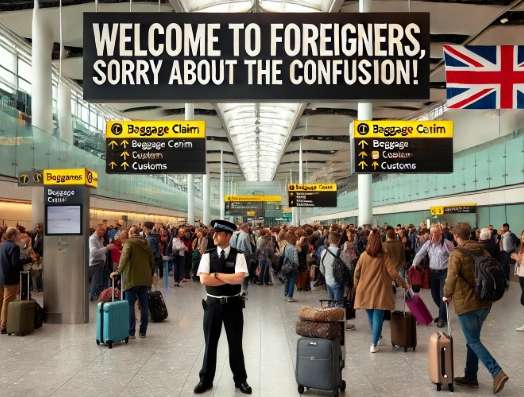UK Travel Rule Revisions Eliminate ETA Requirement for Transit Passengers Amidst Rising Prices.
Navigating the Evolving Landscape of UK Travel Authorizations: A Glimpse into Heathrow’s Future
Imagine stepping off a long-haul flight at London’s Heathrow Airport, the bustling gateway to the United Kingdom. As you navigate the sprawling terminals, a new layer of travel bureaucracy adds a touch of complexity to your arrival experience. The recently introduced Electronic Travel Authorization (ETA), while streamlining entry for many, has undergone a series of adjustments and price hikes, leaving travelers scrambling to keep up with the latest regulations. This evolving landscape of UK travel requirements necessitates a closer look at the ETA’s nuances and implications for both transit passengers and those seeking to enter the country.
Initially, the ETA mandate extended to all travelers from visa-exempt countries, including those merely transiting through UK airports without passing through border control. This sparked immediate protests from the aviation industry, highlighting the logistical challenges and potential disruptions to connecting flights. In response, the UK government implemented a temporary exemption for passengers transiting airside at Heathrow and Manchester airports. This reprieve offers a temporary respite for connecting travelers, but its provisional nature necessitates ongoing monitoring and potential revisions. The aviation industry’s concerns remain a focal point, and the government’s reassessment of this exemption will shape the future of airside transit procedures.
Beyond the transit exemption, the financial implications of the ETA system have also drawn considerable attention. The initial fee of £10 is now slated to increase to £16, a substantial jump that adds to the overall cost of travel to the UK. This price hike complements a broader trend of escalating immigration-related fees. The proposed increase for naturalization as a British citizen to £1,605 and the rise in Certificates of Sponsorship costs to £525 underscore the government’s efforts to generate revenue through immigration processes. These adjustments aim to bolster the UK’s coffers by an estimated £269 million annually, reducing reliance on public funds and potentially impacting the accessibility of immigration pathways.
The implementation timeline for the ETA further complicates the travel landscape. While currently in effect for nationals of 54 countries, including the US, Canada, Australia, and several others, the mandatory ETA requirement for EU citizens will commence in April 2025, with applications opening in March of that year. This staggered rollout adds another layer of complexity for travelers planning future trips, requiring them to factor in the ETA application process based on their nationality and travel dates. The two-year validity of the ETA, allowing multiple stays of up to six months each, offers some flexibility for frequent travelers, but the application process and associated fees remain a significant consideration.
The list of countries whose citizens currently require an ETA includes a diverse range of nations from across the globe. From the Americas to Asia and the Pacific, the ETA extends its reach to travelers from Antigua and Barbuda, Argentina, Australia, the Bahamas, and Bahrain, among others. This extensive list underscores the global impact of the UK’s new travel authorization system, shaping the entry procedures for a significant portion of the international traveling public. The common thread among these nations is their visa-exempt status for short-term travel to the UK, highlighting the ETA’s role in enhancing border security while maintaining streamlined entry processes.
The evolving nature of the UK’s ETA system underscores the need for travelers to stay informed and adapt to the latest regulations. As the landscape of international travel continues to shift, understanding the nuances of the ETA, including transit exemptions, fee increases, and implementation timelines, becomes crucial for seamless entry into the United Kingdom. Whether you envision yourself navigating the bustling corridors of Heathrow Airport or exploring the vibrant streets of London, keeping abreast of these evolving travel requirements ensures a smoother and more informed journey. As the ETA system matures, its impact on the travel experience will continue to unfold, prompting both travelers and the aviation industry to adapt to the changing dynamics of international travel.
Share this content:












Post Comment